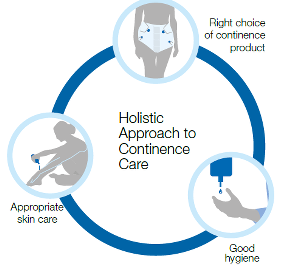A new whitepaper explores why a holistic and personalized approach to continence is necessary, and how institutions and caregivers can design and implement holistic continence solutions.
Incontinence is not just about handling the physical aspects of leakage and loss of bladder and/or bowel control. Incontinence affects many other aspects of life, which is why ABENA recommends following a holistic approach to continence care in order to improve quality of life and care for the many people whose lives are affected by incontinence.
Holistic continence care at Abena
It is estimated that 40-50 percent of people over 80 live with some degree of incontinence that requires the use of continence products and various forms of care. Through a holistic approach we aim to improve quality of life for incontinent people by enabling institutions and caregivers to provide the best incontinence care possible.
Holistic continence care takes the whole person into consideration, meaning that a holistic approach to continence is a sum of many factors. These factors must always be determined in the treatment and care of each individual patient. Through knowledge learned over decades of studies in best-practice, we at Abena have created a holistic approach to continence care based on three main elements:
- Right choice and combination of incontinence products: From right size, type and absorbency level in continence products, to fixations products, protective bedding etc. (Read our guide to finding the right product for incontinence).
- Appropriate Skin Care: practice careful and approproate skin care in order to avoid painful skin confitions such as IAD
- Practice Good Hygiene: from gloves, bed protection to waste management
Why is a holistic approach crucial for good continence care?
A holistic approach takes the whole person into consideration, including diet, exercise, skincare, general lifestyle, and quality of life. In addition, it considers the role of the caregiver, and places emphasis on prevention as well as the proper treatment of continence related conditions.
In a holistic approach, good continence care is a sum of many factors.
When incontinence is well-managed, most people are free to live active, normal lives with a high quality of life. In a socio-economic perspective, it is also more cost-efficient to prevent continence related conditions, rather than to treat often painful conditions.
Continence care knowledge center
Explore personalized continence care knowledge delivered by experts
Whitepaper: Personal hygiene in the health care sector
Learn how a holistic approach to hygiene takes physical health and the quality of life of the patient and nursing staff into consideration.



